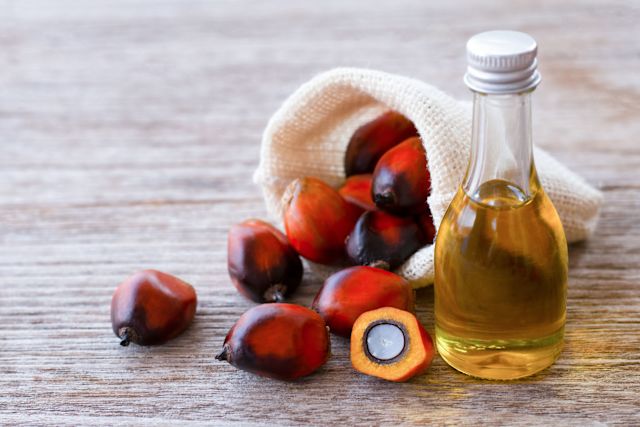Updated on March 28, 2024.
If you’ve eaten baked goods or used cosmetics or soap, chances are you’ve encountered palm oil. While it's one of the world’s most frequently used vegetable oils, its effects on health may be uncertain. Some experts claim that consuming too much palm oil can increase your risk of chronic illnesses, including heart disease and cancer. But what are the facts?
What is palm oil?
Made from the fruit of the oil palm tree, palm oil is a versatile ingredient. It’s found in countless products, from beverages to biofuels (liquid fuels made from biological sources like plants), animal feed to infant formula. Primarily, it’s used as a cooking oil in Asian and African countries. The oil can also be processed into other substances with names often found on food or personal care product labels, including palm stearin, sodium lauryl sulfate, and sodium laureth sulfate.
Most of the world’s palm oil (more than 80 percent) is produced in Indonesia and Malaysia. A number of other countries contribute the remainder. Producers export both the crude and refined versions of the oil to nations all over the world, who then use it in their own production and manufacturing processes.
Palm oil plantations have been scrutinized for decades due to their detrimental effects on the environment. These massive industrial farms have replaced tropical forests in many areas of the world, destroying the habitats of endangered animal species and contributing to climate change. They are also known for abusive and exploitative labor practices. These practices include the use of child and forced labor, as well as excessive work hours and violent treatment of workers.
Palm oil and your health
Over the years, questions have frequently been raised about the effects of consuming palm oil on heart health. This is due in large part to its saturated fat content (fat that is solid at room temperature, like butter). Tropical oils such as coconut and palm oil tend to contain more saturated fat than other vegetable oils, like olive and canola oil. Getting too much saturated fat in your diet can increase the risk of some illnesses, including cardiovascular disease (CVD, heart and blood vessel disease) and stroke.
Still, there’s little evidence of a clear link between palm oil and CVD. For example, in a 2018 systematic review published in the journal PLoS One, scientists couldn’t prove that palm oil consumption and CVD risk were related. But they couldn’t prove there wasn’t a connection, either. Similarly, a 2021 review in the journal Nutrients found the health impact of palm oil to be inconclusive. Both concluded that more research was necessary.
There have also been concerns about the role of eating palm oil in risk for cancer. For example:
- In 2016, the European Food Safety Authority warned that heating palm oil above a certain temperature (200 degrees C or 392 degrees F) could produce substances that are linked to cancer in rats and mice.
- Also in 2016, a study published in the journal Nature suggested that ingesting palm oil could make cancer cells more aggressive (faster growing and more likely to spread to other areas of the body). Even though the study involved mice rather than humans, it raised concerns about popular food products containing palm oil, including the chocolate hazelnut spread Nutella.
- An extension of the 2016 Nature study, published in 2021 also in Nature, suggested that the palmitic acid found in palm oil—but not other oils—promoted the spread of cancer cells in mice.
Despite these findings, there is no solid evidence that palm oil can affect the risk of cancer in humans. Few studies have been conducted—and these have been entirely on animals—and more research is needed to prove a connection.
In the meantime, some experts have defended palm oil. In 2019, a group of food industry, nutrition, and toxicology experts published an article in Nutrients claiming that moderate consumption of palm oil as part of a healthy diet posed no health hazards and no increased cancer risk.
Should you eat palm oil?
Ultimately, the research has been conflicting and inconclusive, and the credibility of some studies has been questioned. In a 2019 bulletin, the World Health Organization (WHO) warned that a significant number of palm oil studies are funded by the palm oil industry, throwing their conclusions into doubt. To get an accurate health picture, the WHO continued, “independent, comprehensive” studies will be needed in the future.
In the meantime, if you’re concerned about ethical, environmental, or potential health risks of palm oil, switching to olive oil or canola oil for cooking may be a wise decision. Also be sure to read nutrition labels on any packaged foods you purchase.
Whatever oil you choose, remember that consuming too much can add extra calories to your diet, which can cause weight gain and affect your risk for some chronic illnesses such as diabetes.







